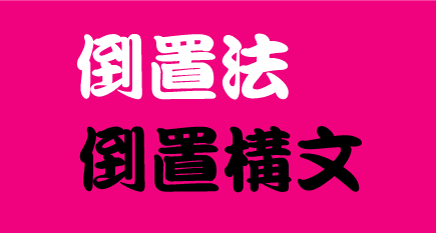今日は、倒置(Inversion)を英会話エースが解説します。倒置とは、英語文法において通常の語順を変更することで、文に強調や特別なニュアンスを加える手法です。倒置は、否定語や副詞句の強調、条件節、比較表現など、いくつかの特定の場面で使用され、フォーマルな印象や詩的な表現を作り出すことができます。ここでは、倒置の主なパターンとその使い方について詳しく解説します。
否定語での倒置についていうと、文頭に「never」「seldom」「hardly」などの否定的な副詞が置かれると、通常の語順が変わり、主語と助動詞(またはbe動詞)の順序が逆転します。例えば、「I have never seen such a beautiful view(私はこんなに美しい景色を見たことがない)」は、「Never have I seen such a beautiful view」と倒置することで強調が生まれます。このように、否定の副詞が文頭に置かれることで、その事実がより強く伝わるのです。
さて、条件文における倒置があります。条件文では通常「if」が使われますが、「if」を省略して助動詞やbe動詞を文頭に置くと倒置が成立します。例えば、「If you should need any help, call me(もし助けが必要なら、私に電話して)」を「Should you need any help, call me」と表現することで、形式ばった印象や控えめなニュアンスが加わります。また、「If I were rich, I would travel(もし私が裕福ならば、旅に出るだろう)」は「Were I rich, I would travel」となり、より仮定の状況が強調されます。
次に、強調表現「Only+副詞句」も倒置の一つといえます。「Only after」「Only if」などの句が文頭に来る場合、主語と助動詞の位置が逆になります。たとえば、「Only after the meeting ends can you enter the room(会議が終わった後でのみ、入室できます)」は、条件の制限が強調され、後続の行動が限定的であることがより明確に伝わります。
さらに、場所・方向を表す副詞句の倒置も、文の冒頭に特定の場所や方向を強調する際に用いられます。例えば、「A large tree stands in the garden(大きな木が庭に立っている)」は「In the garden stands a large tree」とすることで、場所が先に示され、視覚的なイメージが強調されます。これにより、聞き手や読者はまず場所をイメージし、その後にその場所にある対象物に注目します。
最そして後に、比較表現における倒置です。「as」や「than」を使った比較表現では、文がより詩的に聞こえたり、強調の効果を生むために倒置が用いられます。「She is as talented as is her sister(彼女は姉と同じくらい才能がある)」のように倒置すると、通常の語順では味わえないニュアンスが加わります。
エースの教える英文法の倒置は、英語表現をより印象的にするためのテクニックであり、日常会話よりも、文語体やフォーマルな文書、詩的な文章でよく見られます。倒置を適切に使うことで、読者や聞き手の関心を引き、文章に深みを加えることができるため、英語の表現力を高めたい人にとっては大変有効な手法です。
さあ、ご一緒に英文法を学びましょう。











